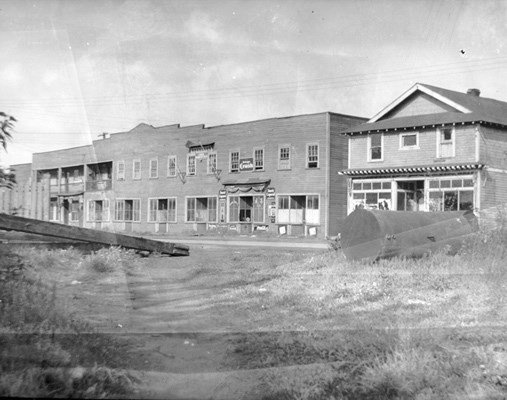During the 1930s, when it got too hot in Vancouver, gamblers would drive to New Westminster's Chinatown to play their luck.
The city's Chinatown had some of the best gambling in the Lower Mainland, local historian and author Jim Wolf says.
"They would all get out (of the car) and go into secret back alleys and into these little cubbyholes to the gambling dens, where the big money tables were, and just have these unbelievable gambling groups," Wolf says.
The local gambling room operators knew which police were on the take and which weren't, and they'd have spies on the end of the alley looking for police, says Wolf. They had names for the cops - like hook nose.
"So if they saw 'old hook nose' coming around, they'd shut things down," Wolf says.
Another trick was to put up false panels and do their gambling on the other side.
"The police would rush into these stores and try to find where the gambling den was, but there were hidden doorways," Wolf says.
When the police finally managed to figure out how to get in the hidden spaces, all of a sudden everyone would disappear because another doorway to an alley would open up and they would be go through a false wall, Wolf explains.
But gambling wasn't the only vice. The city's red light district was situated beside Chinatown; the brothels were on Carnarvon Street.
"There were all of these little houses on the hillside above Chinatown. It was a whole red-light district," Wolf says.
There were prostitutes of all ethnic stripes, but the Asian ones distinguished themselves by wearing red ribbons in their hair.
Chinatown also housed exotic opium dens, where visitors lounged and smoked the potent drug.
"Opium was freely available, right until the 1920s, and it wasn't just Chinese people that were doing the opium. There were a lot of people using," says Wolf, who, along with Patricia Owen, wrote the book Yi Fao: Speaking Through Memory: a History of New Westminster's Chinese Community, 1858-1980.
The visually stunning book chronicles the story of the industrious and hard-working community through the eyes of four families who made their home in this "second port," which is what Yi Fao means. (The second port reference was used to distinguish it as the second port of entry after Victoria.)
Life in Chinatown
"I think the other part of this, not just about opium dens and the gambling dens, the one thing that distinguishes New Westminster's Chinatown or any Chinatown in British Columbia or North America, is that because there was so much racism against them as an immigrant group, they were very, very much community-minded. They had all of these groups to take care of each other. The philanthropy amongst that immigrant group to take care of themselves ... those things, more than the gambling dens, characterized that society," Wolf says.
Today, in downtown New Westminster, there is no trace of the former cultural hub for Chinese immigrants who made their way to the city from the late 1800s onward.
The original Chinatown was on Front Street between Lytton Square and the woolen mills, according to Wolf. The Great Fire of 1898 destroyed much of it. Chinatown then moved a low-lying area of the city that was frequently inundated by the tides of the Fraser River, Wolf explains. Gradually, structures were built on stilts and on fill to create what was always known as the swamp, he says. The area centred on Columbia Street at McInnes Street and including adjoing streets such as Carnarvon Street and 10th Ave.
Chinese immigrants came to British Columbia for the same reason others had - work and opportunity - but they often endured racial inequality, including lower pay, and, in some cases, longer hours and poorer working conditions than Caucasians.
"A lot of people made a lot of money because of cheap Chinese labour and other Asian workforces that were exploited," Wolf says.
But, he adds, there is no one single story for any immigrant group.
"There were many people that came here and were successful in all sorts of other businesses, whether it's agricultural, lumber and general merchants," he says.
Chinatown dissipated during the First World War because there was a stop to immigration and then wide-spread unemployment after the war. There was also a concerted effort on the part of City of New Westminster to demolish Chinatown, Wolf says.
"There was this move by city officials, especially in the 1920s and '30s to clear it all out, to clean it all up, and try to get rid of what was called the swamp," he says. "And for the most part, they succeeded. Within a few decades, it was almost entirely gone."
Today's view
There is a footnote to the story of the city's almost-forgotten Chinatown - in 2010, New Westminster made history by formally apologizing to its Chinese-Canadian community for the discrimination and racist policies of the last century. The apology came after activist Bill Chu, who is with the group Canadians for Reconciliation, approached city council.
The city has also commissioned another group, the Chinese Benevolent Association of Vancouver, to create a mosaic to commemorate the early Chinese pioneers, said Jun Ing, vice-president of the association.
New Westminster once had its own Chinese Benevolent Society, but it formally disbanded in 1980.
"That organization doesn't exist anymore," Ing said, adding that his Vancouver association is not related to that group, but it does have members who live in New Westminster, and it likely has members who were descendants of the New Westminster pioneer families.
"We've been trying to work very closely with the City of New Westminster in the past four years, we have attended the Hyack Festival parade, and we are thinking about participating again this year," Ing said. "So, we need to put the past behind us and move forward."



